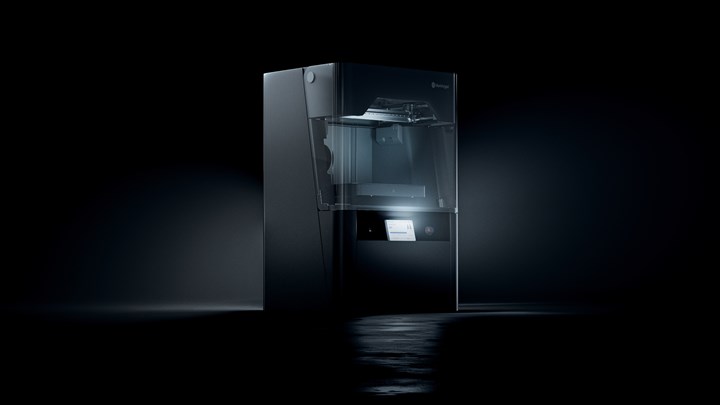3D Printer Designed for the Factory Floor
Markforged unveiled the FX10, designed to support uptime with on-demand replacement parts.
unveiled the FX10 3D printer at the FormNext trade show. The printer is designed to be used on the factory floor, to support production operations by minimizing downtime by fabricating replacement parts as needed.

The FX10 3D Printer. Photo Credit: Markforged Holding Corp.
According to the company, the FX10 enables manufacturers to shorten lead teams and reduce costs associated with replacement parts. The printer features a modular design, facilitating upgrades. The heated chamber enables print speeds that are nearly twice as fast and print sizes that are up to twice as large as previous Markforged industrial series printers, enabling the replacement of metal parts with advanced composites.
The printer also features a touchscreen interface, with new automation and quality assurance technologies. Printhead-mounted optical sensors automatically verify the dimensional accuracy of the part. A laser micrometer in the FX10 scans parts during printing and assists with the machine’s automatic calibration. Inspection software interprets the data from the sensors for dimensional verification, providing users with quality assurance as soon as a print finishes.
The material drawer of the FX10 contains built-in, individually sealed storage bays for up to four 800cc spools. FX10 is able to automatically execute spool changeovers between filament storage bays during a print, and users can reload empty spool bays without disrupting a print.
Related Content
-
420 Stainless Steel Now Qualified With TrueShape 3D Printing Technology
NPE2024: Mantle's additive manufacturing technology is designed for precision tooling.
-
5 Trends in 3D Printed Injection Mold Tooling
3D printing has moved beyond conformal cooling, and is now being applied to injection molds more broadly. Observations on additively manufactured mold tooling from the Plastics Technology Expo — PTXPO 2025.
-
Daimler, OMIC Evaluate Wire-Fed DED for Moldmaking
3D printing a core and cavity on machine from Gefertec, followed by machining, allowed for a complete mold tool to be produced in three days.




